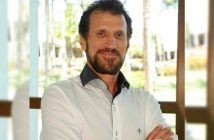The event gathered the company’s sales team in Varginha, MG, for the launch of Yaravita Café and to discuss data on the expressive productivity increase in the Brazilian coffee-growing sector
Product launch, productivity, pricing, sustainability, global scenario. And fertilization in coffee-growing, of course! These were some of the topics discussed at the I Coffee Sector Nutrition Workshop, held last week in Varginha, MG, directed to Yara’s sales team, a leading fertilizer manufacturing company, www.yarabrasil.com.br.
The company’s foliar feeding expert, Gustavo Nunes, presented the Yaravita Café, a major launch by Yara in the Brazilian market. “The Yaravita line already exists, but now we have a specific product for coffee, containing the main micro and macro nutrients this crop requires,” he explained. Its composition includes Boron, Zinc, Nitrogen and Magnesium.
Fertilization X Productivity
“The only coffee-producing countries that have significantly increased productivity in coffee plantations have been Brazil and Vietnam. Last year, our productivity reached 32 bags per hectare, while the average for the remaining producers (except for Vietnam) amounted to 15 to 16 bags per hectare,” said Yara’s Global Manager for the Coffee Sector, Mr. João Moraes, at the opening of the event.
“Much has been said about the price factor in coffee-growing, but it is important that we also talk about the problems within farms. With 16 bags per hectare, you are not productive anywhere in the world and coffee growers need to pay attention to these issues,” said Mr. Moraes.
And to make things worse, around 90% of global producers are small farmers. “They lack the understanding and structure to become more competitive. And it’s also our role to help educate producers, they have to understand how much their coffee cost, it is necessary to individually manage plots, and to know what is their potential return on the investment made. Then I think they should include their families in the process. Ask their wives to manage their accounts, ask their sons to elaborate Excel spreadsheets, it is necessary to increasingly professionalize management”, he evaluated.
Mr. João Moraes mentioned the case of a 14% productivity increase in Vietnam: “There, such a substantial increase has been merely due to better fertilization,” he explained.
“You don’t apply the same amount of fertilizer on the whole farm. Agronomic efficiency has to go hand in hand with economic factors”
And another aggravating factor is that other coffee growers practically do not count on any research entity. “In this regard, Brazil is light years ahead of other competitors, just see what EMBRAPA and universities like UFLA – Federal University of Lavras -, have produced in terms of research”, he concluded.
Those who attended the lecture given by Professor Jeffrey Sachs during the II World Coffee Producers Forum in 2019, (read full article in the link) held in Campinas, could perceive some converging points between that teacher´s discourse and final proposal and the view of a businessman in relation to the global market. That teacher suggested, among other issues, that Brazil should share its researches in the area with the global coffee-producing community at large.
Yara has worked with the coffee sector in different producing regions of the world and has already implemented 26 projects, with the purpose of multiplying knowledge and results. It was founded in 1905, to fight the hunger that ravaged Europe at that time.
Web portal Grão Especial attended the event at Yara Fertilizantes’ invitation.



